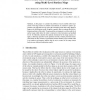Free Online Productivity Tools
i2Speak
i2Symbol
i2OCR
iTex2Img
iWeb2Print
iWeb2Shot
i2Type
iPdf2Split
iPdf2Merge
i2Bopomofo
i2Arabic
i2Style
i2Image
i2PDF
iLatex2Rtf
Sci2ools
AMS
2007
Springer
2007
Springer
Active Monte Carlo Localization in Outdoor Terrains Using Multi-level Surface Maps
Abstract. In this paper we consider the problem of active mobile robot localization with range sensors in outdoor environments. In contrast to passive approaches our approach actively selects the orientation of the laser range finder to improve the localization results. It applies a particle filter to estimate the full sixdimensional state of the robot. To represent the environment we utilize multi-level surface maps which allow the robot to represent vertical structures and multiple levels. To efficiently calculate the optimal orientation for the range scanner, we apply a clustering operation on the particles and only evaluate potential orientations based on these clusters. Experimental results obtained with a mobile robot in an outdoor environment indicate that the active control of the range sensor leads to more efficient localization results.
| Added | 07 Jun 2010 |
| Updated | 07 Jun 2010 |
| Type | Conference |
| Year | 2007 |
| Where | AMS |
| Authors | Rainer Kümmerle, Patrick Pfaff, Rudolph Triebel, Wolfram Burgard |
Comments (0)

